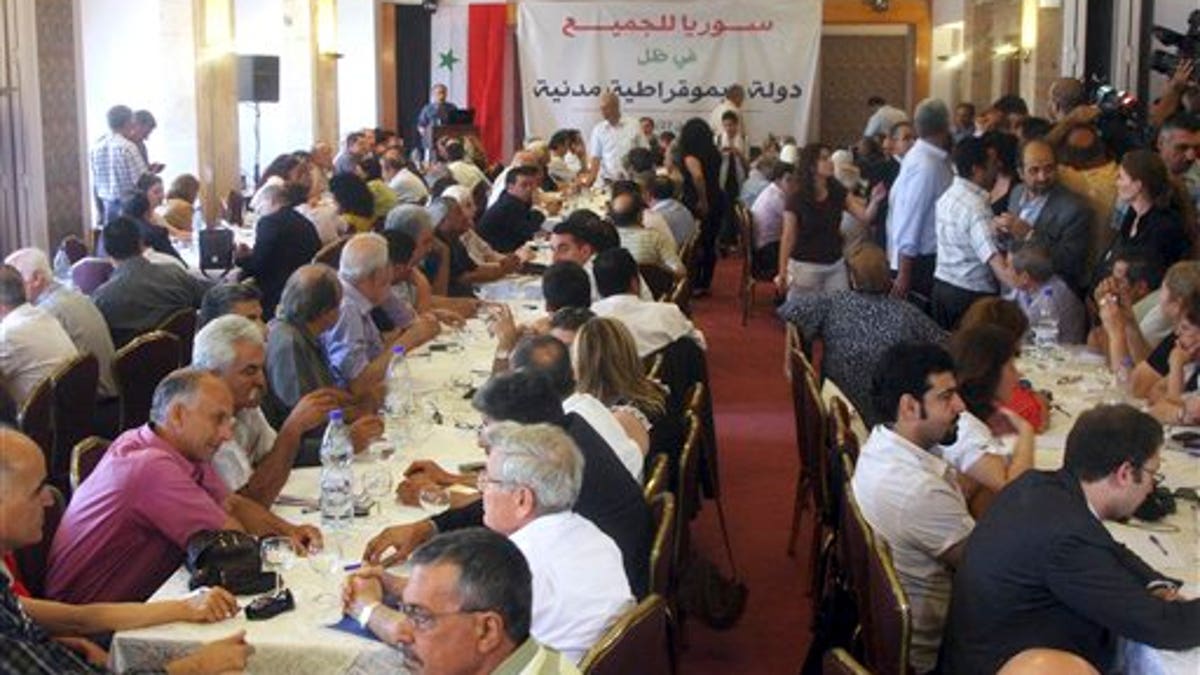
June 27: Prominent opposition figures and critics of Syrian President Bashar Assad's regime gather for a meeting in Damascus, Syria. Nearly 200 critics of President Bashar Assad met Monday in the Syrian capital for the first time during the three-month uprising against his rule, in a government-sanctioned gathering some activists complained would be exploited to give legitimacy to the regime. The attached banner in Arabic reads "Syria is for everybody, in the shadow of a democratic civil state." (AP)
BEIRUT – Critics of Syria's authoritarian regime, at a rare gathering in Damascus, called Monday for a peaceful transition to democracy and an end to the Assad family's 40-year-old monopoly on power. Otherwise, they said, Syria's current chaos might destroy the country.
Almost 200 opposition figures and intellectuals gathered to produce "a vision about how to end tyranny," said an organizer.
While unprecedented in its size, the public meeting at a Damascus hotel -- the first since the uprising against President Bashar Assad's rule began in March -- had the government's approval, leading to criticism that the regime was trying to take on a veneer of openness while continuing its bloody crackdown on dissent. Many regime opponents stayed away for that reason.
Still, the dissident gathering, at which the government was unrepresented, would have been unthinkable a few months ago in tightly controlled Syria. It came as the regime was reeling under the pressure of a relentless protest movement, and authorities were clearly anxious to show they were making concessions.
Syria's state-run news agency, meanwhile, reported a national political dialogue planned by Assad would begin July 10, and "all factions, intellectual personalities, politicians" would be invited. As Assad had said in a June 20 speech, the agenda will include constitutional amendments, including one to open the way to political parties other than the ruling Baath Party, the agency said.
The dissidents' meeting began with the Syrian national anthem, followed by a minute's silence in honor of the hundreds of Syrians who have been killed in the suppression of protests.
"We are meeting today ... to put forward a vision about how to end tyranny and ensure a peaceful and secure transition to the hoped-for state: the state of freedom, democracy and equality," Louay Hussein, a prominent writer and one of the organizers, said in an opening speech. The current regime should "perish," he added.
Michel Kilo, one of Syria's best-known writers and pro-democracy activists, called on the regime to immediately build trust with the opposition by allowing secular, nonviolent opposition parties to exist and by amending an article in the consitution that designates Assad's Baath party as "the leader of the state and society."
The only salvation is through a peaceful political transformation, Syrian scholar Munther Khaddam said at the conference. Otherwise, he said, "the alternative to that is the unknown, and the destruction of (Syrian) society," he said.
But some opposition figures and activists, both inside Syria and abroad, dismissed the meeting of 190 critics as an opportunity for the government to convey a false impression it's allowing space for dissent, rather than cracking down.
The opposition says some 1,400 people have been killed -- most of them unarmed protesters -- during the government crackdown on three months of street protests.
"This meeting will be exploited as a cover-up for the arrests, brutal killings and torture that is taking place on daily basis," said opposition figure Walid al-Bunni. He told The Associated Press from Damascus he was not invited to the conference because authorities had "vetoed" some names.
An activists' group, the Coordination Union of the Syrian Revolt, also denounced the conference, calling it a "cheap ploy" that the government wants to exploit.
The divisions highlighted the fractured nature of the Syrian opposition, which has long been silenced, imprisoned or exiled by the autocratic regime in Damascus. Opposition meetings so far have been held abroad by exiles living in the West or elsewhere in the Middle East and who don't have significant followings inside the country.
Those inside Syria say change must come from within, but the split over Monday's conference reflected tactical differences over approaches.
Rami Abdul-Rahman, the London-based director of the Syrian Observatory for Human Rights, said the crossfire of accusations within the opposition should end.
"Today's meeting in Damascus is a consultative one. It is not a meeting with the Syrian regime," he said. "The aim is to find a way to make the transition to democracy, to stop the slide toward civil war."
As the meeting began, some 50 people gathered outside the downtown hotel where it was held, shouting pro-Assad slogans.
Whether the meeting might produce partners for President Assad's proposed "national dialogue" remains to be seen.
Organizer Hussein told AP there would be no dialogue with the state "before the halt of the military's crackdown." But others at the conference seemed more supportive of dialogue.
"No one wants to harm the country, we only want reforms. ... We support dialogue," said Georgette Attiya, a university professor attending the meeting.
In Washington, the White House described Monday's Damascus meeting as "worthwhile," but said it could not be considered a significant step forward as long as the government continues its violent crackdown on civilians.
The European Union and the U.S., condemning the bloodshed, have imposed economic sanctions on Assad and other members of the Damascus leadership.
The state-run news agency, SANA, said Monday that Assad met with U.S. Rep. Dennis Kucinich, Democrat of Ohio. The agency said Assad told the U.S. lawmaker it was important to distinguish between people's legitimate demands and "armed groups that are exploiting these demands to sow chaos and destabilize the country."
Kucinich's Washington office said he has many Arab-Americans in his district and constituents had asked him "to investigate conditions on the ground in Syria."








































